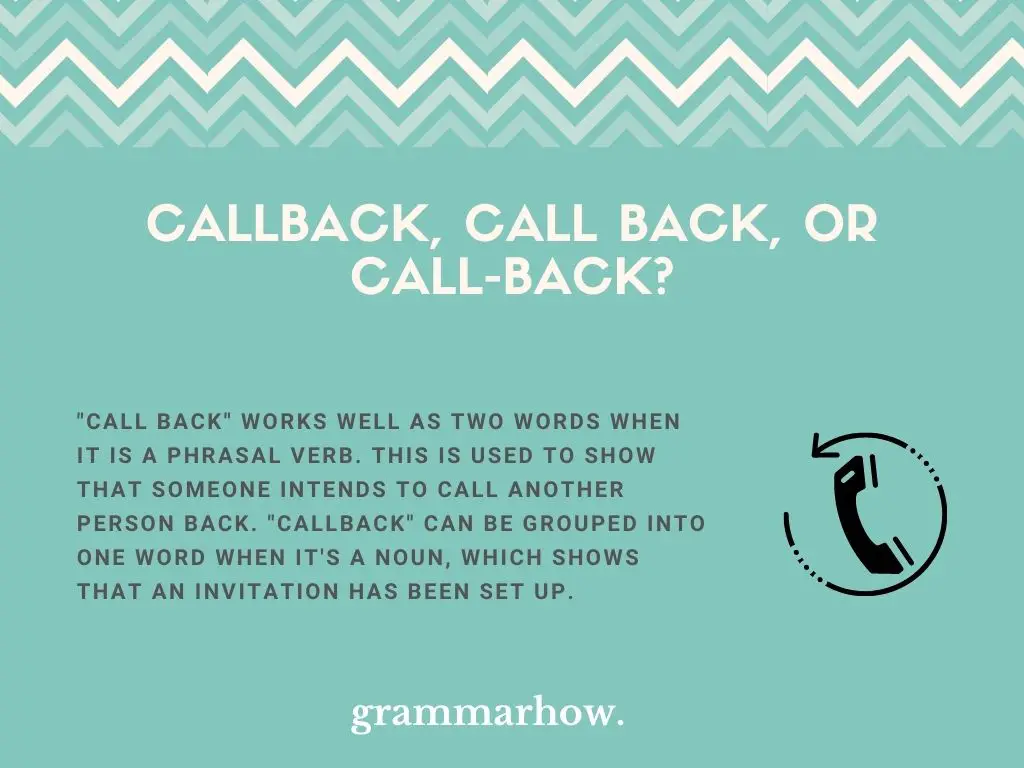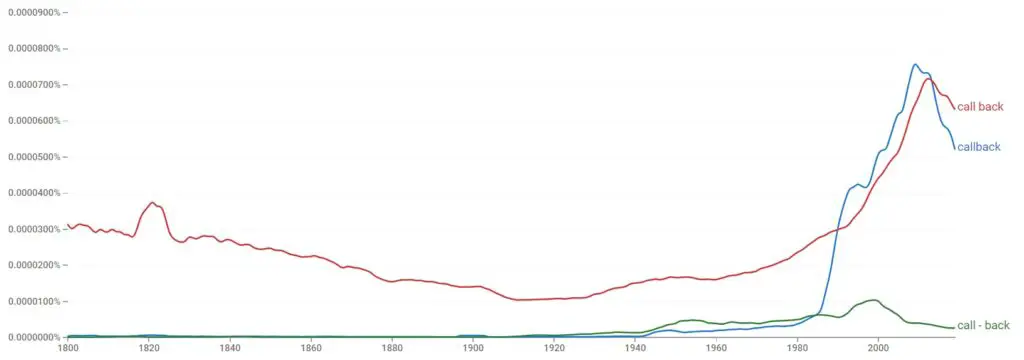You might come across “callback” a few times in English. It’s important to know whether it’s one or two words or whether a hyphenated variation is suitable. This article will explore the answer to that question so that you don’t have to worry about it again!
Call back vs. Call-back vs. Callback
“Call back” works well as two words when it is a phrasal verb. This is used to show that someone intends to call another person back. “Callback” can be grouped into one word when it’s a noun, which shows that an invitation has been set up.

According to Google Ngram Viewer, “callback” and “call back” are almost identical in usage. The two-word variation is slightly more popular, but they are both acceptable to use. The hyphenated form is incorrect, which is why it’s barely seen on the graph.

In The Cambridge Dictionary and The Oxford Dictionary, “callback” is officially defined as a noun form. We group it in two words whenever writing it this way.
Both dictionaries also list “call back” as a phrasal verb, which shows that it’s suitable to write it as a two-word variation in many cases as well. It mainly depends on the context.
If you’re struggling to understand the differences between nouns and verbs, you can check this out:
- Verb: I will call back when I get the chance.
- Noun: I received a callback notification.
Is “Callback” One Word?
“Callback” is one word when it’s used as a noun. We use this to show that two parties have set up an invitation for a second call. We group the two words because they share a meaning when written in this way that native speakers can recognize.
Perhaps some of these examples will help you with it:
- I’m going to my callback audition in just a while. Can you cover for me?
- We need to visit the callback center to learn whether there’s anything else for us to do.
- I didn’t get a callback, which shows that I didn’t get the job! Oh well, there’s always next time.
- Can you sign these guys up for a callback? I’m interested to learn more about them and their prospects.
Is “Call back” Two Words?
“Call back” should be written as two words when it is a verb. We use the phrasal verb form to show that we are taking action to “call somebody back.” It works well to show that there is an intention to do something, but it is not used to modify anything in a sentence.
Typically, we would include a pronoun between “call” and “back” when used as a phrasal verb. This helps us to specify who needs to be “called back.”
You might benefit from checking out the following examples:
- I’m going to call you back after this, but I need a little more time before I do.
- Can you call back a little later? I’m very busy, but it should take much longer.
- Call me back when you get a chance. This is very important, and I don’t want you to miss it.
- Let’s call back when we know they’re free. Then they can’t avoid us!
Is “Call-back” Hyphenated?
“Call-back” never needs to be hyphenated. We use it as either a verb (where the hyphen would make no sense) or a noun (where the hyphen would break English rules). Therefore, it’s best to avoid using this grammatically incorrect variation.
Here are a few examples to help you make more sense of it :
- Correct: I did not think I was going to get a callback, but I was pleasantly surprised when I did.
- Incorrect: You will not get a call-back from us at any point within the next three weeks.
- Correct: I need to call back the person who rang me the other day, but I can’t remember the number.
- Incorrect: If you want to call-back, you need to catch me at the following number.
Is “Back” Capitalized In The Word “Call-Back”?
Since “call-back” isn’t an officially recognized form, we do not need to go over the capitalization of the hyphen form. However, it’s still good to know that neither “call back” nor “callback” would need to capitalize “back” because they are not proper nouns.

Martin holds a Master’s degree in Finance and International Business. He has six years of experience in professional communication with clients, executives, and colleagues. Furthermore, he has teaching experience from Aarhus University. Martin has been featured as an expert in communication and teaching on Forbes and Shopify. Read more about Martin here.

